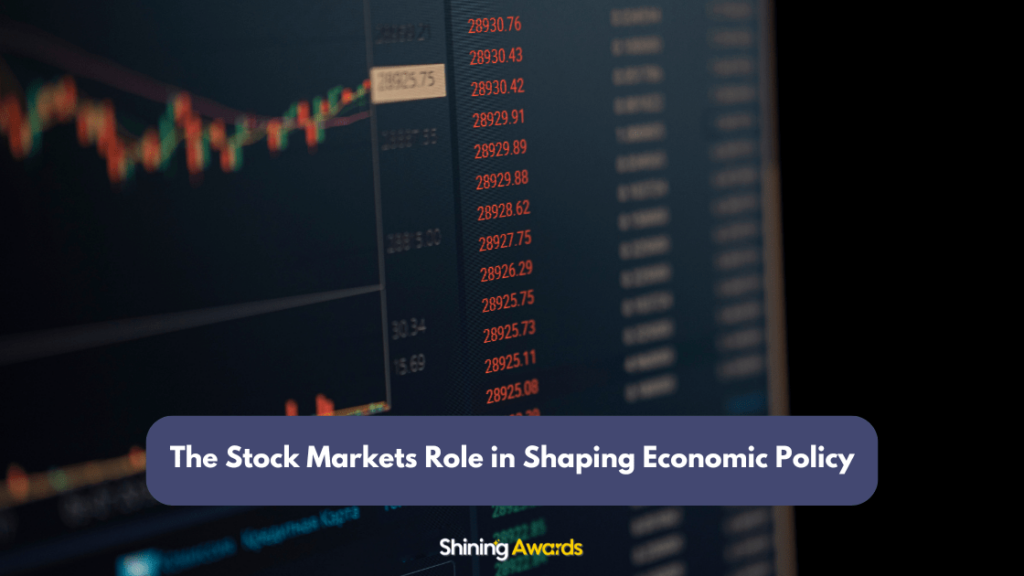The Stock Markets Role in Shaping Economic Policy
The Stock Markets Role – Amidst the intricate dance of global economies, the stock market emerges as a powerful conductor, shaping and reshaping the contours of economic policy. In this exploration, we delve into the symbiotic relationship between the stock market and economic policy. From tracing historical precedents to dissecting contemporary trends, this article illuminates the nuanced interplay between market forces and policy decisions, shedding light on the intricate mechanisms that drive financial landscapes. Additionally, if you want to know more about investments and firms, you may sign up here.
The Stock Markets Role

Stock Market Indicators: A Barometer of Economic Health
Market indicators are multifaceted, capturing various aspects of economic activity. For instance, the performance of leading sectors, such as technology or finance, can shed light on consumer sentiment, corporate profitability, and business investment.
Similarly, fluctuations in market volatility, as measured by metrics like the CBOE Volatility Index (VIX), reflect changes in investor sentiment and risk perceptions. These indicators collectively offer a comprehensive view of economic trends and prospects.
During periods of economic uncertainty or crisis, stock market indicators assume heightened significance. Sharp declines in stock prices may signal underlying concerns about market stability and economic resilience, prompting policymakers to take corrective actions. Conversely, sustained periods of market growth and stability can bolster confidence among consumers and investors, fostering an environment conducive to economic expansion and policy initiatives.
However, it’s essential to recognize the limitations of relying solely on stock market indicators. While they provide valuable insights, they may not capture the entirety of economic activity, particularly in sectors not represented in equity markets. Moreover, market movements can be influenced by various factors, including speculative trading, geopolitical events, and external shocks, which may not necessarily reflect underlying economic fundamentals.
Influence of Market Sentiment on Policy Making
The influence of market sentiment on policymaking is a complex interplay between economic perceptions, investor behavior, and policy responses. Market sentiment refers to the collective mood or psychology of investors, which often manifests in the form of buying or selling activity in financial markets.
This sentiment can be influenced by a myriad of factors, including economic data releases, geopolitical events, corporate earnings reports, and central bank announcements.
Policymakers closely monitor market sentiment as it can have significant implications for economic stability and policy effectiveness. Sharp shifts in sentiment, such as sudden market downturns or speculative bubbles, can prompt policymakers to reassess their strategies and take preemptive measures to mitigate risks. For instance, during periods of market turmoil, central banks may intervene to provide liquidity or adjust interest rates to restore confidence and stabilize financial markets.
Moreover, market sentiment can influence policy decisions beyond monetary policy. Fiscal policymakers may adjust government spending or taxation in response to market dynamics, aiming to stimulate economic growth or address imbalances. Similarly, regulatory authorities may introduce measures to enhance market transparency, curb excessive speculation, or prevent systemic risks posed by volatile market behavior.
However, policymakers must exercise caution when responding to market sentiment to avoid overreacting or fueling further instability. While market signals can provide valuable insights into economic conditions, they may also be subject to irrational exuberance or herd behavior, leading to exaggerated market movements. Therefore, policymakers often rely on a combination of market analysis, economic data, and expert judgment to formulate effective policy responses.
The Stock Market as a Policy Tool
The stock market’s role as a policy tool extends beyond its function as a barometer of economic health. Policymakers often leverage the stock market to achieve specific policy objectives, ranging from stimulating economic growth to regulating financial markets. This utilization of the stock market as a policy tool reflects its significance as a driver of investor confidence, capital formation, and wealth creation.
One way in which policymakers use the stock market is through monetary policy interventions. Central banks may adjust interest rates or engage in quantitative easing programs to influence borrowing costs, asset prices, and overall economic activity. By influencing stock market valuations and investor expectations, monetary authorities seek to encourage investment, consumption, and economic expansion.
Additionally, policymakers may employ targeted measures to address market inefficiencies or promote financial stability. For instance, regulatory reforms aimed at enhancing market transparency, reducing systemic risks, or curbing excessive speculation can help safeguard investor confidence and market integrity. Similarly, fiscal policies, such as tax incentives for investment or infrastructure spending, can stimulate stock market activity and support broader economic objectives.
Moreover, the stock market serves as a mechanism for capital allocation, directing investment flows towards productive sectors and growth opportunities. Policymakers may incentivize investment in strategic industries or emerging technologies through regulatory frameworks or public-private partnerships, fostering innovation and economic diversification.
Conclusion
In the symphony of economic dynamics, the stock market stands as a resonant chord, echoing the pulse of nations’ economic health. Through the lens of market indicators, sentiment analysis, and policy interventions, this article has unveiled the intricate interplay between market forces and policy imperatives. As we navigate the currents of economic uncertainty and opportunity, understanding the symbiotic relationship between the stock market and economic policy remains paramount, guiding the path toward prosperity and stability.
